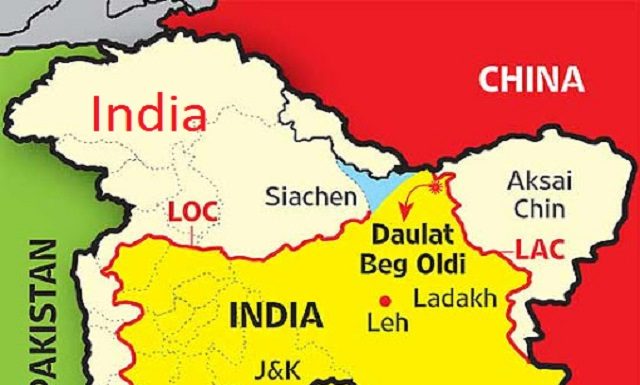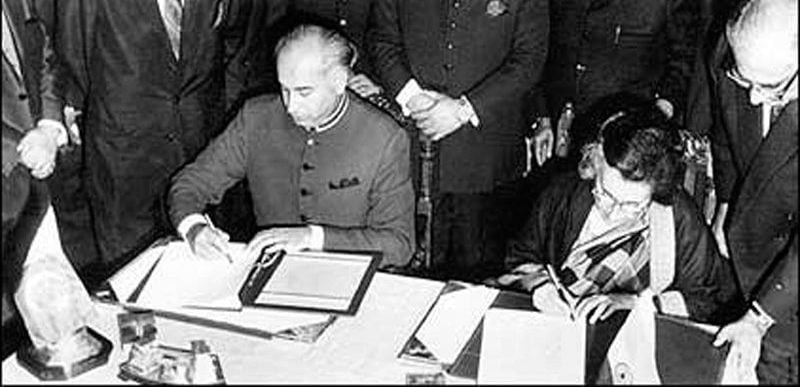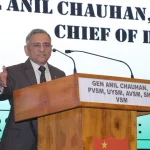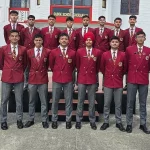After the Pahalgam Terror Attack (April 22, 2025) where 26 civilians ( 25 Indians and 1 Nepalese) were killed. India accused Pakistan Based Terrorists of executing the attack. In response, India took strong measures by downgrading the diplomatic ties and freezing The Indus Water Treaty. Pakistan retaliated by “suspending” the Shimla Agreement by thinking it could counter India’s aggressive actions. But it actually gives India a major strategic advantage
Background: What Is the Shimla Agreement?
The agreement was signed on July 2, 1972, by Indira Gandhi of India and Zulfikar Ali Bhutto of Pakistan. It came in the aftermath of the 1971 Bangladesh Liberation War, during which Pakistan faced a devastating defeat.
- Key Points of The Treaty:
- Bilateralism: India and Pakistan must resolve disputes peacefully and bilaterally, without third-party intervention (i.e., not at the UN, not involving the US, China, etc.).
- Respect for the LoC: Both sides agreed to respect the Line of Control in Jammu & Kashmir and not try to alter it unilaterally.
- No use of force: Committed to settle differences without war or violence.
Hence, Shimla Agreement froze the Kashmir dispute in a bilateral framework, benefiting India by keeping the world out.

How India Can Benefit From It?
1. Diplomatic Advantage:
- India can immediately launch a global diplomatic campaign:
- Highlighting that Pakistan cannot be trusted to honor any international agreement.
- Paint Pakistan as a rogue state violating peace agreements.
- Use this as a basis to tighten international sanctions, especially in bodies like the FATF (Financial Action Task Force), UNSC, and IMF.
Hence, it will weaken Pakistan’s standing with the US, EU, Gulf nations — many of whom already view Pakistan with suspicion.
2. Kashmir Strategy:
- India can argue that:
- Since Pakistan abandoned Shimla Agreement, India is free to challenge the LoC.
- India could legally and morally pursue claims on Pakistan-Occupied Kashmir (PoK) and Gilgit-Baltistan.
- India could strengthen internal legal moves — like making Article 370 abrogation a global accepted fact without fearing “bilateral violation” accusations.
Hence, LoC could become more dynamic and contested if India wants.
3. Military Options Open Up:
- Under Shimla Agreement, war was discouraged. If it’s dissolved:
- Surgical Strikes, Balakot-type airstrikes, and cross-border raids become less diplomatically risky.
- India can use forceful retaliation against terror attacks without being seen as violating a peace framework.
Result: India regains coercive leverage to punish Pakistan-backed terrorism more openly.
4. Reevaluation of Diplomatic Engagements:
- Shimla Agreement laid down basic diplomatic protocols for maintaining relations, exchanges and peaceful engagements.
- India can rethink on:
- Whether it even needs embassies operating fully.
- Visa policies (suspending tourist, student, pilgrim visas from Pakistan)
- Cross-border trade (Indian already restricted it largly)
- Bilateral summits (no obligation to engage anymore)
India can also review other treaties it has with Pakistan post-1972 and annul or freeze them if they no longer serve national interests.
Strategic “Action Plan” India Could Follow
If Pakistan dissolves Shimla, India should:
| Step | Action | Goal |
|---|---|---|
| 1 | Global diplomatic offensive at UN, G7, G20, OIC | Isolate Pakistan internationally |
| 2 | Pass resolution in Indian Parliament reaffirming entire J&K (including PoK, GB) as India | Legal reinforcement |
| 3 | Strengthen military posture along LoC, Air Power | Deter Pakistani misadventures |
| 4 | Expose Pakistan’s internal crises (Balochistan, TTP, Sindh unrest) internationally | Pressure Pakistan internally |
| 5 | Seek Western economic and technological sanctions against Pakistan | Economic chokehold |
| 6 | Expand intelligence and cyber operations | Undermine Pakistan’s military establishment quietly |
| 7 | Prepare for small-scale tactical military operations in PoK if necessary | Assertive pressure |
Caution
- China Factor: China might exploit instability to increase influence in Pakistan (especially through CPEC and BRI).
- Short-Term Escalation: Border tensions could rise sharply.
- Global Pressure: Some Western countries might initially urge “restraint” to avoid full-scale war.
Hence, India must balance assertiveness with strategic patience.













